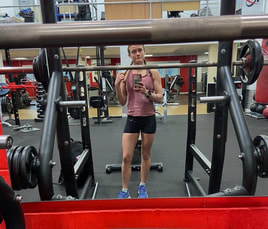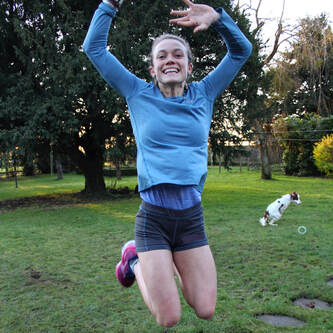|
One of the main things I have prioritised over the past few years as a runner, is becoming as strong, and injury-resistant as possible. Sadly, this did not quite work out as well as I hoped, as I ended up with a stress fracture in my foot at the Commonwealth Games. However, as with any life difficulty, this injury offered me with an opportunity. An opportunity to learn and become an even more robust athlete! More robust than I previously thought I could be. As a result, here are some of the changes I have implemented into my plan. Recovery is key. It is not rocket sign that in order to reap the benefits of hard work, we need to give our bodies the time to recover and rebuild. However, sometimes it can be easy to dismiss the importance of recovery. I have therefore focused on prioritising recovery. For example, ensuring I don’t spend the whole day on my feet, or that I am getting plenty of rest in between sessions. It may be that every now and then you cannot help it, but if I spend the majority of the day on my feet regularly, it is going to hinder my recovery, thus affecting my next run session. I have also never been a fan of rest days, I don’t think many athletes are. However, I am working hard to change my mindset towards them. They are quite simply, one of the easiest ways to boost performance. Rest days allow your body to recover from all the hard work you have put it through, and repair your muscles so they can become stronger. On occasion, I have been guilty of pushing my rest days longer and longer, but this has changed. I am now being strict with incorporating rest into my training schedule, whether I feel I need it or not, because rest is my friend and secret weapon. Vary cross training. I have always loved the cross trainer (or elliptical as some call it). When lockdown struck and the gyms were shut, I resorted to doing all my cross training on it and neglecting other forms of cross training. Whilst it was not as demanding on my body as running, it still put a lot of weight through my feet. Therefore, I have made the conscious decision to mix up my cross training and utilise the bike and the pool a lot more. This allows me to still work my body, but in a non-weight bearing manner, allowing my body to recover better in between running sessions. Stronger.
Before about 3 months ago, my S&C programme consisted of the exact same programme, 3 days a week, every week, for the past 5 years. Ultimately, it was doing nothing, because there has been no change to it. My body became wise to the exercises and no longer got any benefit or recovery prevention from it. I have since joined with a qualified S&C coach in order to become stronger and more robust. I can honestly say that I have worked areas of my body that have never been strengthened before. This excites me, because if I can become stronger, I can become faster, and a lot more injury-resistant. Get it checked! As runners, we frequently get niggles and tightnesses. I however, have always been very quick to dismiss them and pretend that everything is completely fine, even when it’s not. I have always looked on admitting to niggles as a sign of weakness, but this has got to stop, because they aren't. They are just part of sport. Therefore, I no longer want to look on niggles as a sign of weakness, but instead be smart and listen to my body. If something does not feel right, no matter how small it is, I need to trust myself, because ultimately, we know ourselves better than anybody else. When something is causing discomfort, this IS a sign of an existing physical weakness, but responding to it is a sign of strength. In order to be the strongest, most robust athlete I can be, I need to address them at every stage they occur, before they become serious. Sleep! It’s not a revolutionary statement to say that sleep is such an important part of our daily lives, especially if you are very active. However, I still think it is often neglected. I have always been very quick to get up an hour earlier just to ensure I can fit everything in, but this isn’t necessarily the best way forward. By doing this on a regular basis, I would skip out on one of the easiest ways to make gains in training. When we sleep, our bodies recover, therefore the better and more we sleep, the better they can recover, allowing us to improve. Waking up early, or going to bed late, can hinder this recovery process, leaving you tired going into the next session, and putting yourself more at risk of injury. Therefore, following my injury, I have vowed to put sleep first. Unless unavoidable, getting plenty of sleep is non-negotiable. These are just a few changes I have made in order to become the strongest, fastest, most robust athlete I can be going forward.
0 Comments
Leave a Reply. |
Hannah IrwinI love to run and I love to write, so I write about running! Archives
March 2023
Categories |


 RSS Feed
RSS Feed
